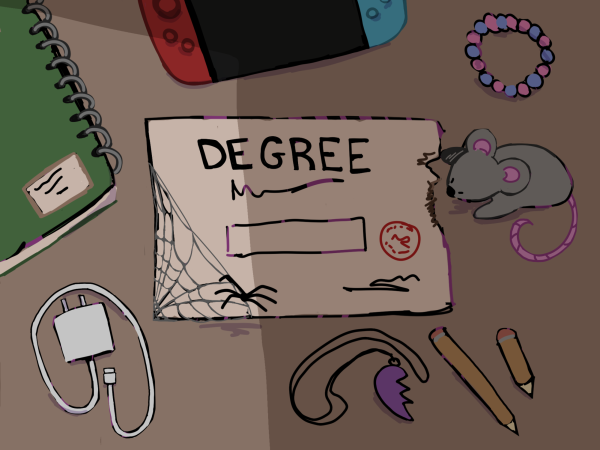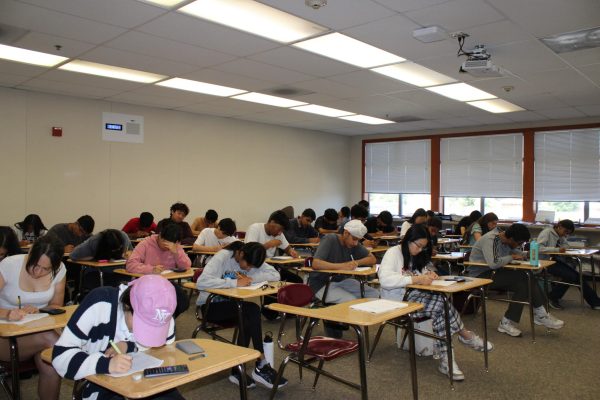New district internet surveillance tactics are draconian
When using the internet, the last thing we expect are eyes other than ours keeping tabs on our activity. The internet is our own safe space where we have the freedom to do, say, and search for anything we want anonymously without judgment from others.
That was until the San Ramon Valley Unified School District started allowing teachers to view our screens live and our parents to access our Chromebook search history.
On Nov. 18, the district sent an email to parents (but not students!) containing information about new platforms being used to surveil students’ internet activity. The stated purpose of the new surveillance, according to a FAQ included in the email, is “to minimize the likelihood of harm or dramatic consequences with district technologies by educating students and setting standards to protect our students, staff, and the district”.
The new platforms include Securly Classroom, Securly Home, and Bark, the latter of which allows the district to monitor Google Drive documents, applications, and emails on district Google accounts. Unlike Securly, Bark is always active on student Google accounts and isn’t limited to district-issued Chromebooks.
Meanwhile, Securly Classroom allows teachers to monitor students’ Chromebook screens live during class, and Securly Home sends a weekly snapshot email to parents of students’ search history, including websites visited and search terms, on their Chromebooks.
Securly Home is only enabled for parents who accepted an email invitation that was sent to all parent emails registered in Infinite Campus, according to a document explaining Securly Home that was included in the Nov. 18 email.
In addition, while on district Wi-Fi, “search history, social media posts, messages, and email are all monitored” according to the Nov. 18 email FAQ, with the information collected being stored on district servers.
These measures are an invasion of privacy, especially for those who research personal topics such as sexual health or mental health resources. The last thing we want is for parents to spy on us and our private navigation of the turbulence of adolescence.
The district asserts that these measures are not a violation of privacy because access to district internet and devices is a “privilege, not a right”. We invite district officials to attend classes at Cal High and try to complete assigned schoolwork without using district technology. Without a hotspot and a personal device, it is essentially impossible.
Most importantly, the new policy has the potential to cause actual physical harm to students. It is possible that closeted LGBT students, who are using Chromebooks to help find information to aid in their understanding of themselves and their gender or sexual identity, are being accidentally outed to their parents, supportive or otherwise, through the weekly snapshot emails sent by Securly.
It is hard to overstate how harmful the district’s new policy is. Instead of protecting our privacy, the district has been concerned with trivial matters, such as Instagram accounts mocking bad parking jobs. In a Dec. 14 email sent to students and parents about the harmless accounts, the district claimed “the safety of our students and staff is a top priority”. Why is safety not a priority when students’ browsing is being exposed to their parents? Where is the safety for closeted LGBT students who can’t come out to their parents?
And finally, why did students receive an email about harmless Instagram accounts, but not one about the new measures being used to reveal their search history to their parents and teachers? It is clear that the priorities of the district are out of sync with the concerns of students.
In addition to the district’s evident lack of prioritization, trust is being lost from the students. Spying on one’s personal internet activity is an easily avoidable opportunity to prevent losing trust and connection with students. Unfortunately for us, it seems as if the district has not considered the amount of confidence and respect we have held to them.
We urge the district to end the capability for parents to access students’ search histories and for teachers to access Chromebook screens, in addition to ceasing the collection of student data over Wi-Fi. We also urge the district to send all email communications to students as well as parents going forward. Although this issue is first and foremost a matter of privacy, it is also a failure in communication.
The district has an opportunity to set a positive example for digital privacy and communication, but only if it ends the new ill-advised surveillance measures.


Mack • Dec 22, 2021 at 1:50 pm
Literally 1984
Samika • Dec 22, 2021 at 8:16 am
As someone who already has paranoia and anxiety problems this stuff is so concerning. Literally 1984. Is there any way we can’t protest these new policies and raise our concerns with the districts’ priorities?